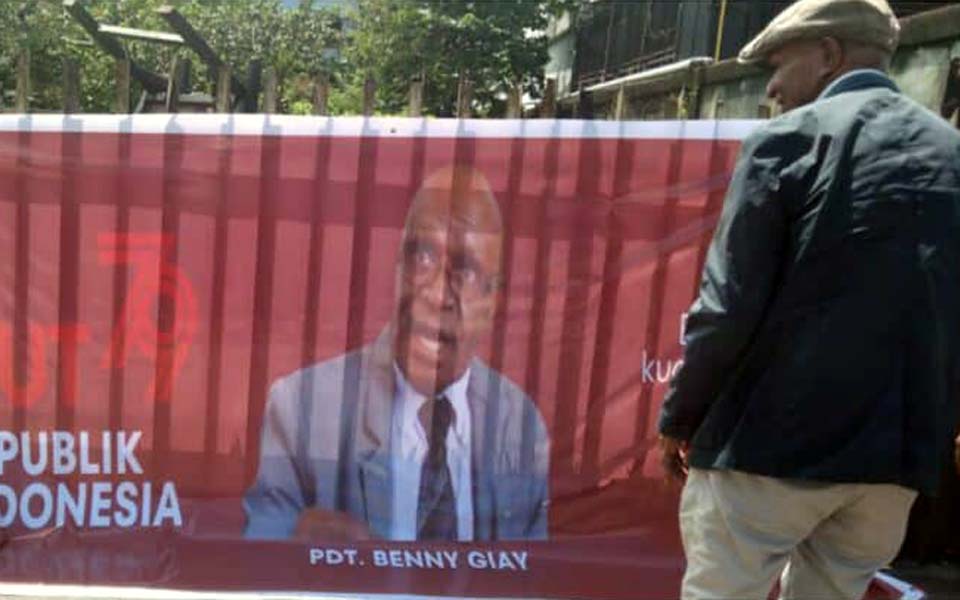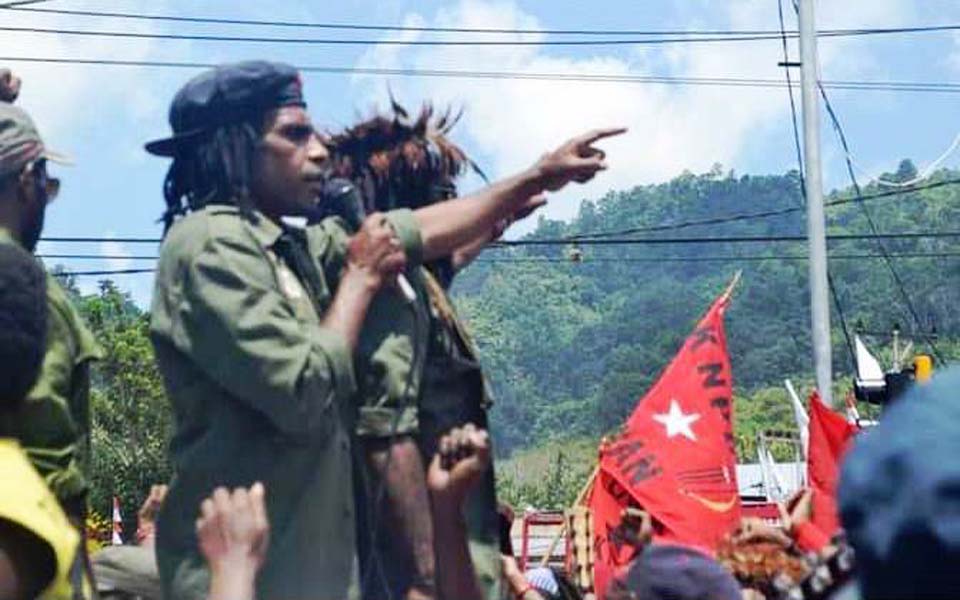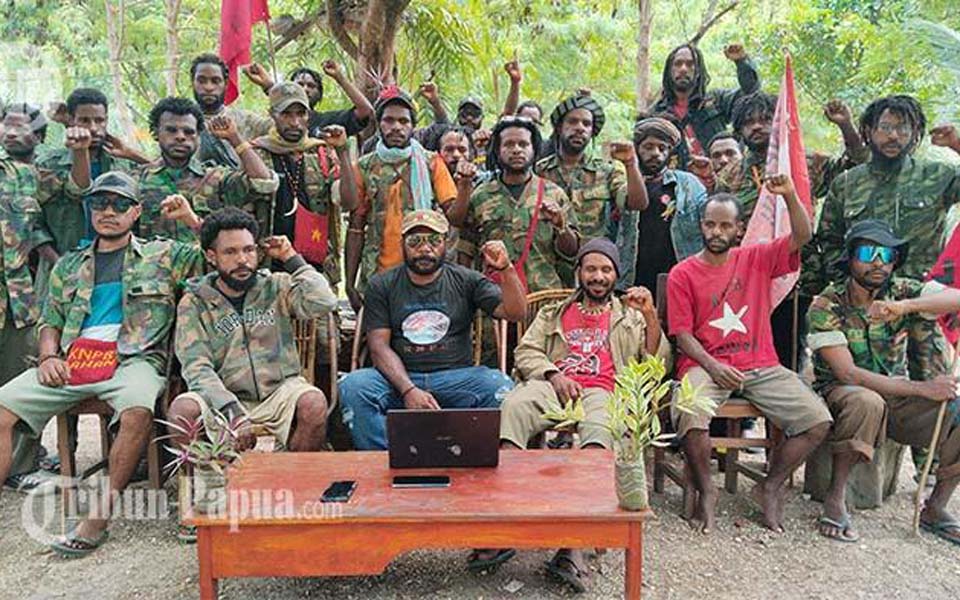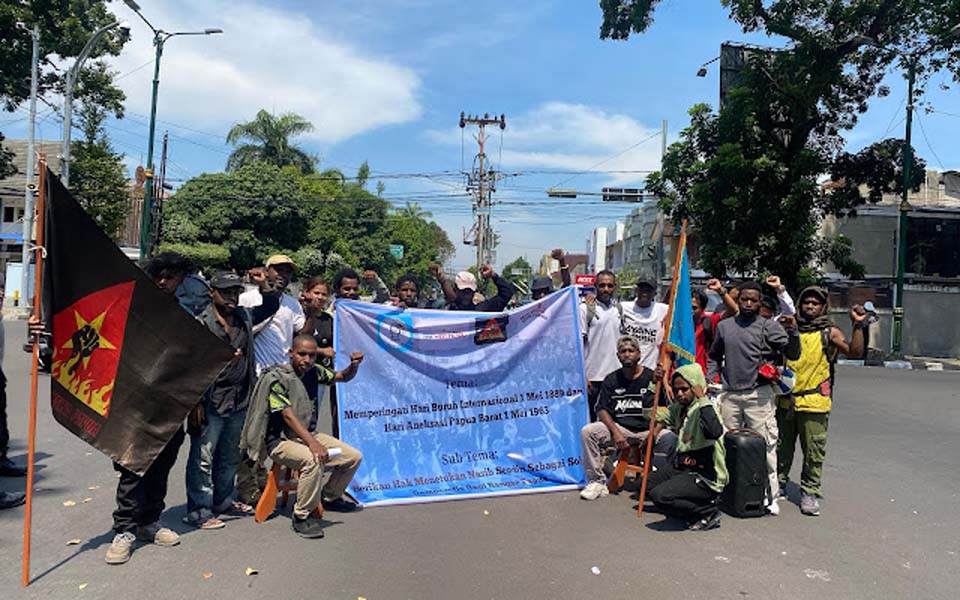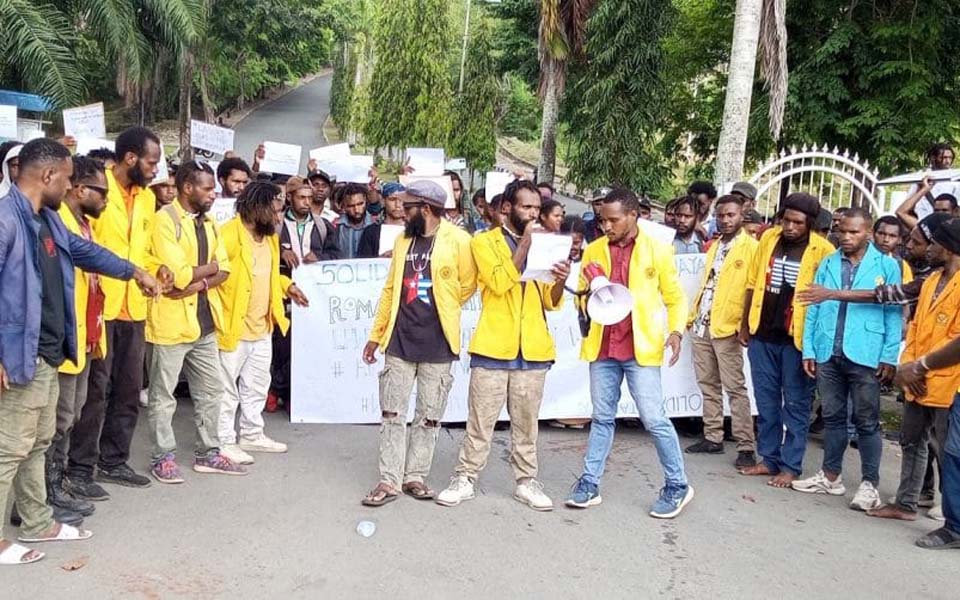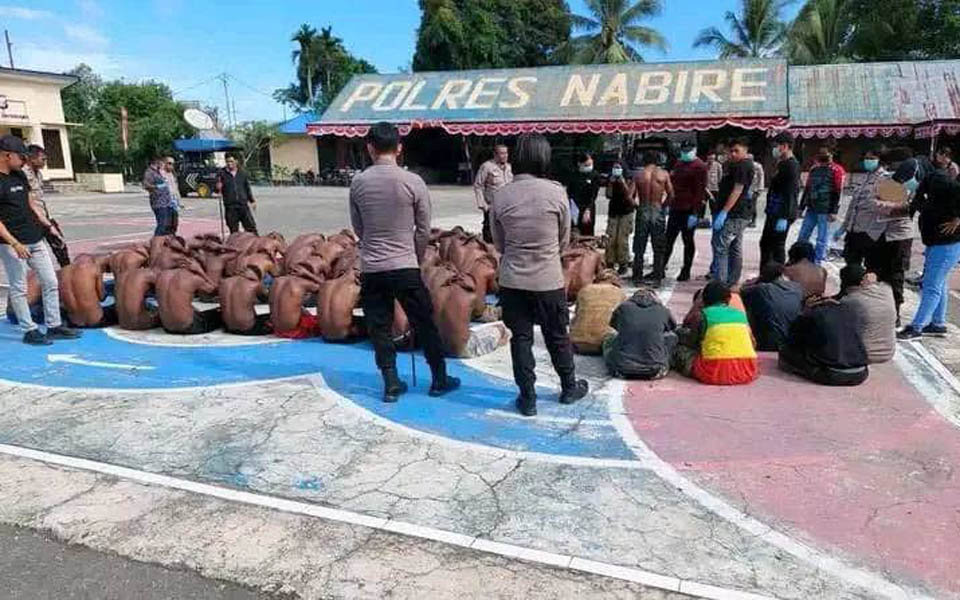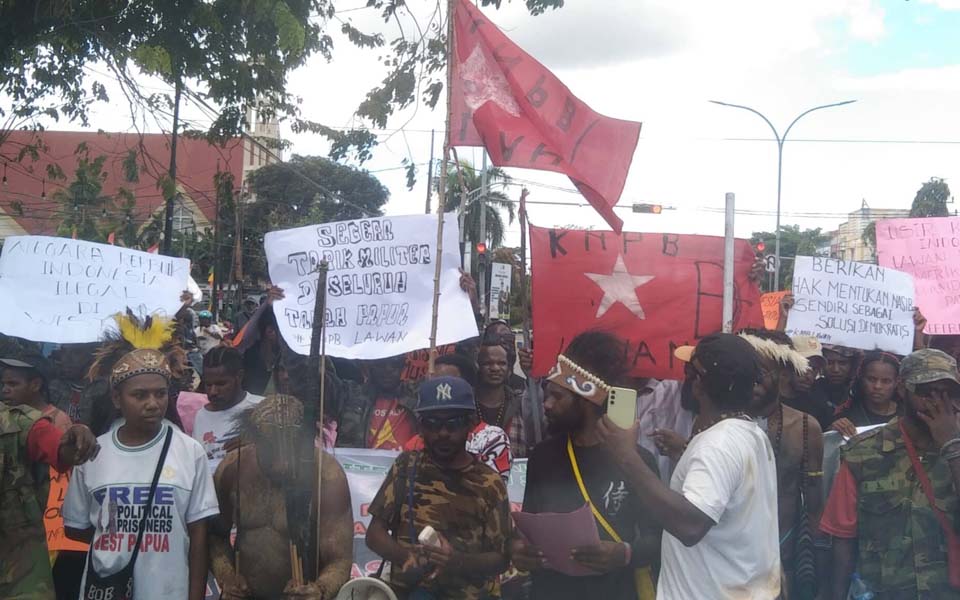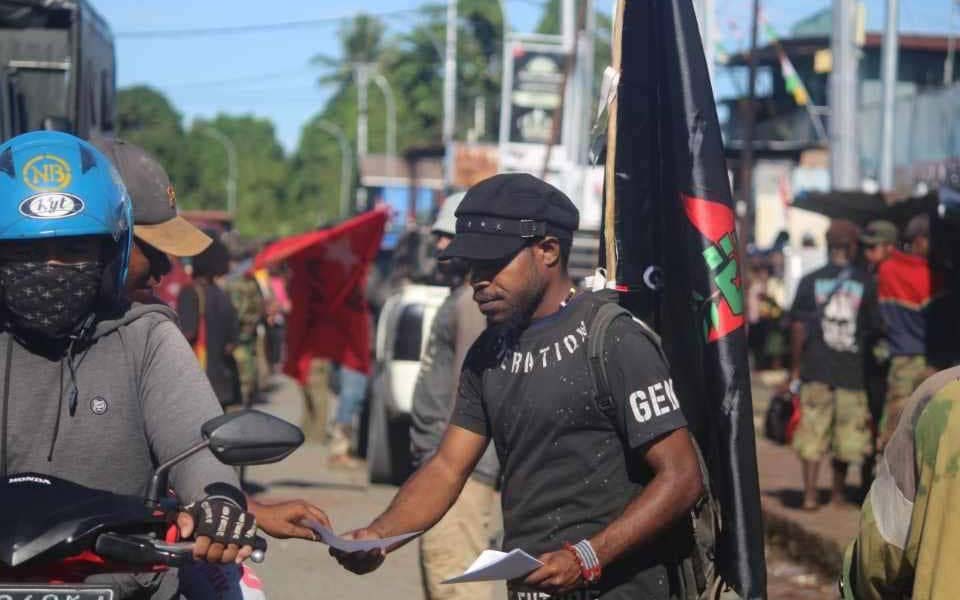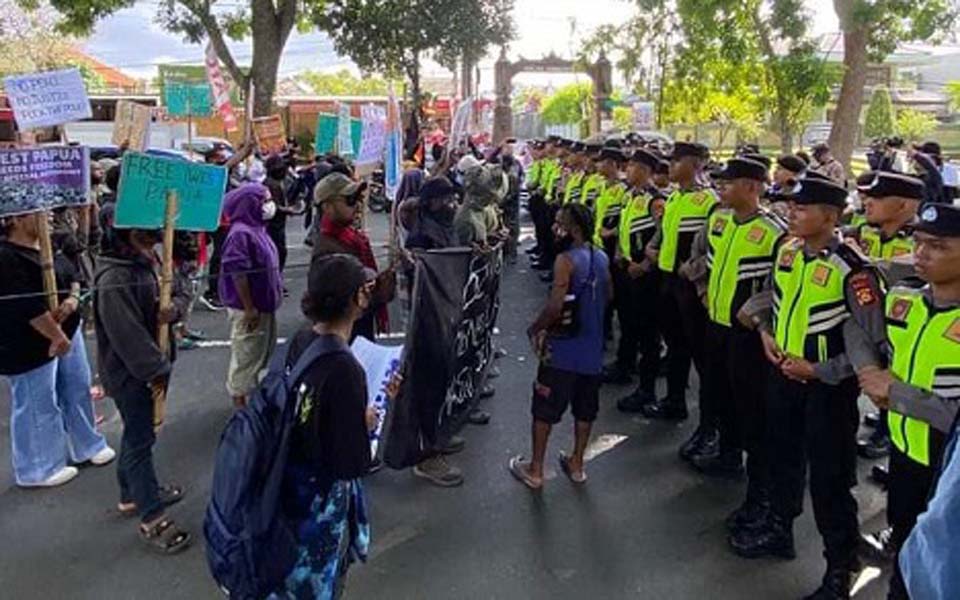Larius Kogoya, Sentani – Leading members of the West Papua Council of Churches (WPCC) consider the installation of banners celebrating the 79th Anniversary of the Republic of Indonesia, which used the names of church figures and WPCC leaders, as a strategy by the state to cover up violence and silence of freedom of expression in Papua.
The banners in question could been seen installed at several points in Sentani, Jayapura regency on August 16, one day before the Independence Day commemorations on August 17, and coinciding with simultaneous actions by the West Papua National Committee (KNPB) commemorating the anniversary of the August 15, 1962 New York Agreement.
In an open statement issued in Sentani on Sunday August 18, the WPCC said that the installation of the banners using their names was done without prior permission and without their knowledge.
WPCC moderator Reverend Dr. Benny Giay said that at around 6.30 am local time on Friday church leaders were shocked by the news of the billboards, which were installed without permission, listing the names of church leaders and their photographs at several locations in the Sentani area.
According to Giay, that morning a peaceful demonstration was planned by the KNPB to commemorate the 1962 New York Agreement.
"After checking, the photographs that were posted without permission were alarming for the church leaders. Because the billboards were posted by certain parties without permission at the same locations (as the planned peaceful actions) and on dates that matched the political (momentum)", said Giay.
Giay explained that the installation of the billboards without permission could be categorised as non-verbal violence against church leaders on Indonesia's Independence Day. The names of several church figures that were unilaterally listed included Giay, Reverand Dorman Wandikmbo, Jayapura Bishop Yanuarius You and Reverand Andrikus Mofu.
“Banners (with the name and photos of) Reverand Benny Giay (were installed) at two locations: Jalan Pos 7 in Sentani and at the intersection in the direction of Gunung Merah and on the road to Kemtuk Gresi. (At the banner with the photos and name of) Reverand Dorman Wandikmbo in front of the Borobudur Sentani Shopping Centre there were thugs who could be seen on guard who approached when the banner was taken down. (The banner with the photo and name of) the Jayapura bishop was at the entrance to the Franciscan Sentani SKPKC [Peace and Unity of Creation Justice Secretariat]. And (the banner with the photo and name of) Reverand Andrikus Mofu, chairperson of the GKI [Indonesian Christian Church] Synod, was also like that”, said Giay.
According to Giay, the incident can be seen as part of a scenario by certain parties to divert attention or trigger conflict between church leaders and the congregation, in this case the KNPB or indigenous Papuans in general, who are experiencing violence and restrictions on their freedom of expression.
"Especially the KNPB whose freedom of expression has been restricted since the first week of this month", said Giay.
According to Giay however, the inclusion of the names and photos of church leaders on the banners also means a challenge and a call to leaders to rebuild the discourse on dialogue and Papua as a land of peace.
"Church leaders can see this incident as a challenge for their pastoral work to raise the spirit of rebuilding the discourse on dialogue and Papua as a land of peace by prioritising what the church and religion can do, while opening themselves up, and looking at the root of the problem of why Papua continues to be a land of conflict", he said.
Giay also noted that the installation of the banners was done in concert with a situation where the Papuan people were at a "dead end", with no clear path forward. According to his observations, Indonesia's security approach strategy since 2018-19 has destroyed the pillars of life along with control over the regions accompanied by violence in the fields of security, the law and judiciary, institutions and democracy, population, communication and information.
"In short, the state has taken over and controlled the land of Papua and civil society without permission. Most recently, (it was marked) by parties who, without permission, used photographs of church leaders, put up billboards celebrating the 79th Anniversary of the Republic of Indonesia. Where previously these parties extended the Otsus [Special Autonomy] Law Volume II, the 1969 Pepera [the United Nations sponsored referendum that saw West Papua become part of Indonesia], the creation of new autonomous regions or DOB in the land of Papua without permission, the 1962 New York Agreement (also without permission), said Giay.
WPCC member Reverand Dorman Wandikmbo believes that the installation of the banners right before Independence Day was an attempt by the state to cover up the violence in Papua.
"They know (that the installation of the banners) did not come from us, they had to do it as part of their failure to embrace religious figures, community leaders, they have failed to build Papua as a land of peace. So that failure is what they want to cover up with billboards in the name of church and religious figures", said Wandikmbo.
Wandikmbo stated that they have called for the church to be the last bastion for the Papuan people. "Like the other day, the KNPB held peaceful demonstrations that were dispersed, [they were] arrested, detained, [forced to] sit in the sun [bare chested], shot at and so on. The only hope for a 'stage' today is the 'stage' of the church, because that's were all Papuans are running to", he said.
According to Wandikmbo, this happened because the right to express opinions in public, peaceful demonstrations by the community, students, and similar activities, have never been given any space in Papua.
- Rallies in Papua marking New York Agreement dispersed with teargas, rubber bullets. Jubi Papua – August 15, 2024
[Translated by James Balowski. The original title of the article was "Spanduk HUT RI Atas Namakan Tokoh Gereja Papua, DGP: Upaya Tutupi Kekerasan Negara".]





